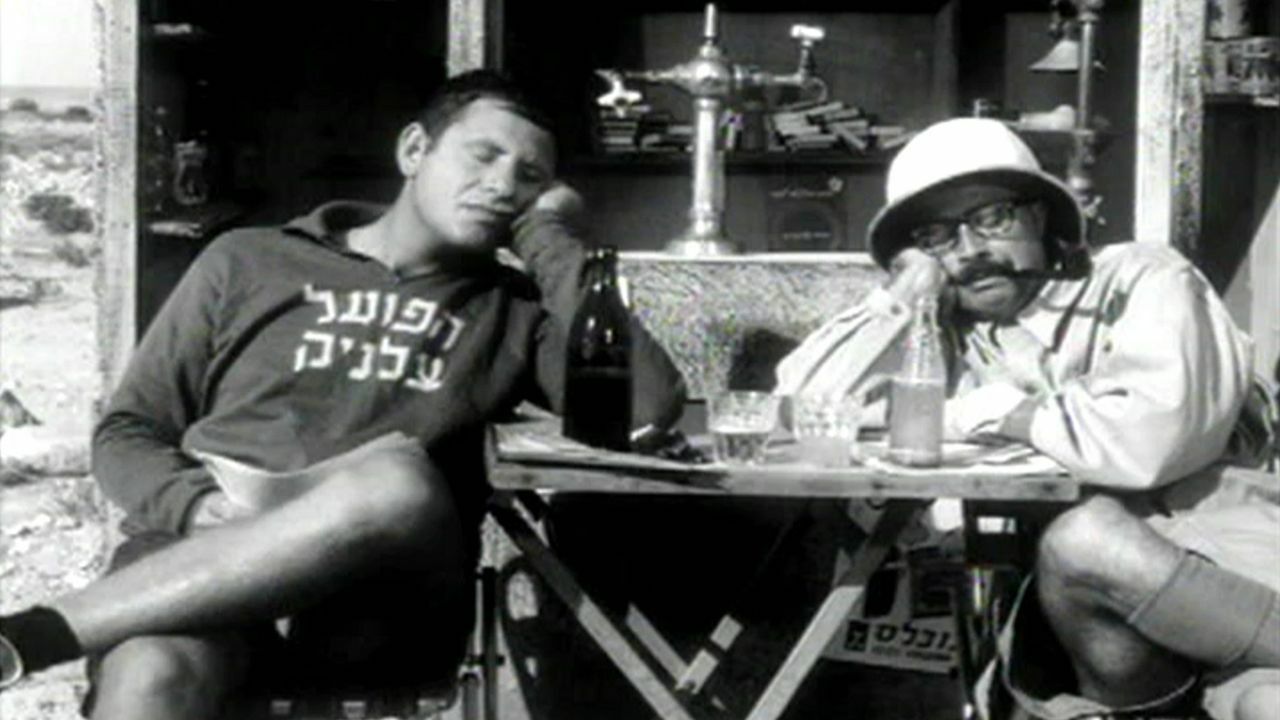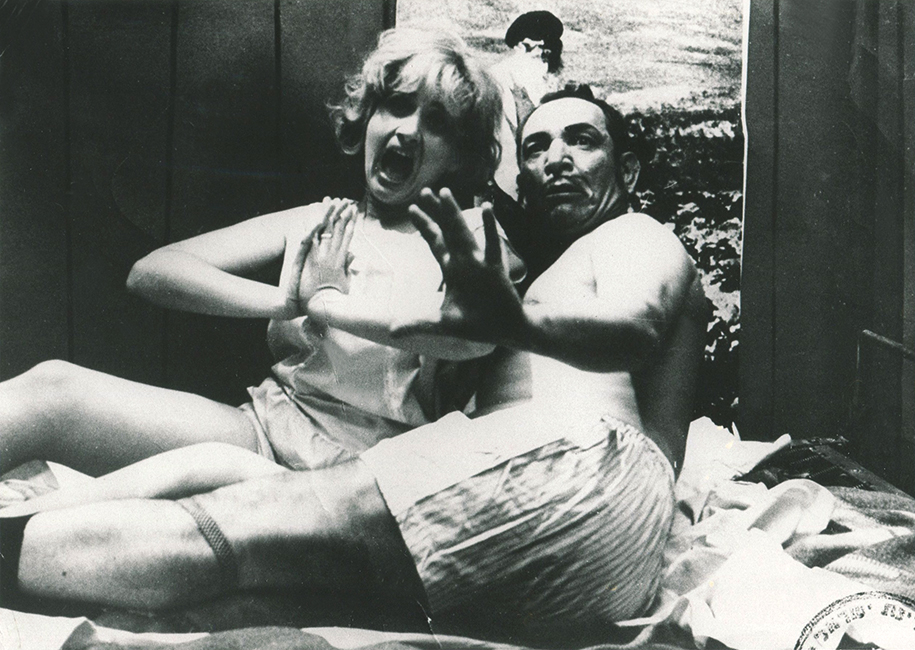Sionism & Zionism & Sionisumu / "Hole in the Moon" by Uri Zoha

Știi tu Uri Zohar, o persoană importantă în istoria filmului israelian? El și-a început cariera ca comedian înainte să devină regizor, făcând filme care sfidează convențiile cinematografice conservatoare, ca un port-drapel al New Sensitivity, o mișcare chintesențială a filmului israelian. A devenit eroul epocii lui, dar atunci brusc s-a transformat într-un un rabin ultra-orthodox carismatic care convertea israelieni seculari. Și primul film completat de jonglerul filmului israelian este "Hole in the Moon".
Protagonistul acestui film este un bărbat numit Cernik. După ce ajunge în Israel ca imigrant, el vine în inima deșertuluii ca să cerceteze un nou pământ. Construiește un magazin, începând să trăiască o viață fără inhibiții în mijlocul pustietății.
Prima mea impresie este că acest film este influențat evident de Nouvelle Vague. Cu peisaje urbane din Israel și deșertul infinit, spiritul liber al lui Cernik aleargă prin tot pământul. Și prin cinematograful său vivace și editarea incoerent de puternică, filmul rezonează în mod direct cu sufletul lui eliberator.
Se întâlnește Cernik cu un bărbat care își conduce un magazin în deșert. Se potrivesc și își petrec zilele să cumpare produsele reciproc, dar nu sunt satisfăcuți cu asta. Atunci ei stabilesc să facă un film! Adună actori și echipaje din tot Israel, Încep să filmează imediat.
Acest film este despre film, ca să spunem, și există o mulțime de filme ca el în această eră, dar poți spune de la început că "Hole in the Moon" este diferit în mod bombastic de restul. Actorii acționează ca un dement pe un set de western sau dramă istorică, scuipând insanitate de la fiecare por de pe corpul lor. Și procedura editării arată filmările multiple în paralel, și ochii publicului sunt expuși la impactul său, supraîncălzindu-se.
A înflorit un așa-numit film sionist care povestește creșterea și excrescența la capitolul național al evreilor în filmul israelian al aniilor '50. Acest film, "Hole in the Moon", este o satiră de-a dreptul pe această tendință. În film, actori arabi spun lui Cernik, "Dați-ne rolul omului bun!" În filmul sionist, arabii mereu sunt răufăcători. Și după o consultare, Cernik și colegii lui îi dau rolul omului bun, unor fermieri care ară prin deșertul sterp și cântă un cântec în lauda sionismului în vervă. Veninul său este atât de respingător încât publicul nu poate râde deși această este satiră.
Și continuă filmarea. La un moment dat, filmul se transformă într-un documentar despre femeile care s-au adunat pe platoul de filmare. Un intervievator întreabă, "De ce vrei să fii actriță?" Și ele răspund în mod vag, "Pentru că vreau să fiu cunoscută!" Dar când femei ia un răspuns ca "De ce?" în mod persistent, cuvintele lor devine extrem de vide, și procesul filmării se pare destul de gol treptat (Și filmul folosește așa-numitiul Cinéma Vérité, de care regizorul își bate joc, așa fiind tehnica dominantă a acestui timp)
După cum s-a menționat anterior, există o mulțime de filme despre film în această perioadă. De exemplu, chiar în Nouvelle Vague, la care "Hole in the Moon" aduce un omagiu, "La Nuit américaine" de Truffaut sau "Le Mépris" de Godard ar trebui să fie considerate ca asemenea filme. Și va exista mai mult film de același gen în viitor, dar acest film este cel mai spectaculos între toate filmele și va fi. Imaginile sale care atacă retinele privitorilor ca un potop, incoerența explosivă care anihilează toată consistență, dar cel mai puternic lucru este critica usturătoare a țării blestemate numite Israel.
În timp ce se desfășoară filmarea, simțim o extindere accelerată a lumii cinematice cu sionismul în esența sa. Este ca și cum ar încerca să construiască o țară sionistă în mijlocul deșertului încă o dată, dar mai vehement și robust. Acest atentat se va ciocni cu tot felul de obstacolele, uneori rupt în mod drastic, dar la sfârșit va face renașterea minunată.
"Hole in the Moon" este un film ambițios, plin de încercările de a penetra inima țării abominabile, Israel. Dar Israelul nu se va prăbuși atât de ușor. Acesta va fi construit în deșertul la fel de devastat ca un craniu, și va striga; Mândria israelienilor nu va fi spulberată!

Do you know Uri Zohar, an important figure in the Israeli cinema history? He began his career as a comedian before becoming a filmmaker, producing films that defy conservative cinematic conventions as a standard-bearer of the "New Sensitivity", an quintessential Israeli cinematic movement. He became the darling of his time, but then suddenly transforming into a charismatic ultra-orthodox rabbi who converted many secular Israelis. And the first feature film completed by such trickster of the Israeli cinema is "Hole in the Moon".
The protagonist of this film is a man named Cernik. After arriving in Israel as an immigrant, he comes to the heart of the desert in search of a new land. He builds a shop, beginning to live an uninhibited life in the middle of nowhere.
My first impression is that this film is obviously influenced by Nouvelle Vague. With Israeli cityscapes and infinite desert, Cernik's free spirit runs through the land. Through vivid cinematography and disjointedly powerful editing, the film resonates directly with Cernik's liberating soul.
Cernik meets a man who is also setting up shop in the desert. They hit it off and spend their days selling each other's wares, but they're not satisfied with that. Then Cernik and his friend set out to make a movie! They gathered actors and crews from all over Israel, starting shooting immediately.
This film is about film, so to speak, and there were a lot of films like it in this era, but you can tell from the beginning that "Hole in the Moon" is bombastically different from the rest. The actors act like a madman on the set of western or period drama, spewing insanity from every pore on their body. And the editing process shows multiple shootings in parallel, and audiences' eyes are exposed by its impact, getting overheated.
So-called Zionist cinema that celebrated the rise and growth of the Jewish people's national capital were flourishing in the Israeli cinema in the 1950s. This film, "Hole in the Moon," is an outright satire on this trend. In the film, the Arab actors say to Cernik, "Give us the role of the good guys, too!" In Zionist cinema, the Arabs were always the villains. And after consultation, Cernik and his colleagues give them the role of good guy, a farmer ploughing through the barren desert and singing a song in praise of Zionism in high spirits. Its venom is so obnoxious that audiences can't laugh although this is satire.
And the filmmaking continues. At one point, the film is transformed into a documentary about the women who have gathered on set. The interviewer asks them, "Why do you want to be an actress?" And they say vaguely, "Because I want to be famous!" But when women get a reply like "Why is that?" persistently, their words are extremely vacuous, and gradually this filmmaking process itself seems very empty (And the film uses the so-called Cinéma vérité technique, which the director mocked as the dominant technique of the time).
As mentioned above, there are many films about film in this period. For example, even in the Nouvelle Vague, to which "Hole in the Moon" pays homage, Truffaut's "La Nuit américaine" and Godard's "Le Mépris" can be considered such films. There will be many more films of the selfsame kind in the future, but this one is the most spectacular of them all and will be. The images attacking the viewer's retinas like a deluge, the explosive incoherence that annihilates all consistency, but the most powerful thing is the scathing criticism of the cursed state named Israel.
As the filmmaking unfolds, we sense the accelerated expansion of a cinematic world with Zionism at its core. It's as if they were trying to build a Zionist state in the middle of the desert again, but more vehement and robust. This attempt will hit all sorts of obstacles, sometimes broken dramatically, but in the end it will make a great revivification.
"Hole in the Moon" is an ambitious film, full of attempts to penetrate the heart of the abominable state of Israel. But Israel will not collapse so easily. It will be constructed into the desert as devastated as a skull, and it will cry out; The pride of the Israelis will not be shattered!

さて、皆さんはイスラエル映画史における重要人物Uri Zoharを知っているだろうか。彼はコメディアンとしてそのキャリアを始めた後に映画作家になり、イスラエルの重要な映画潮流である"New Sensitivity"の旗手として既存の映画文法に捕らわれない映画を製作する。彼は一躍時代の寵児となるのだが、何と突然ユダヤ教超正統派のラビに転向、多くの世俗的イスラエル人を改宗させるカリスマ的存在となる。そんなイスラエル映画界のトリックスターたる彼が、まず最初に完成させた長編映画が今回紹介する"Hole in the Moon"だ。
今作の主人公はツェルニクという男性だ。彼は移民としてイスラエルにやってきた後、新天地を求めて砂漠地帯の中心部へとやってくる。彼は誰もいないこの場所に店を建設し、自由気ままな生活を送りはじめる。
まず最初の印象としては、今作が明白なまでにヌーヴェルヴァーグに影響を受けているということだ。イスラエルの街並みや砂漠を背景として、ツェルニクは自由なる魂を疾走させる。その様がビビッドな撮影や、支離滅裂なまでに力強い編集によって描かれることで、今作はツェルニクの魂とそのまま共鳴することとなる。
そんな折、ツェルニクは同じく砂漠に店を立てる男性と出会うことになる。意気投合した彼らは互いの店に商品を売りあうことで、日常を過ごすのであるが、彼らはそれで満足することはなかった。そしてツェルニクたちが乗り出したのが映画製作だった! 彼らはイスラエル中から俳優やスタッフを集め、すぐさま撮影に取りかかる。
今作はいわゆる映画についての映画であり、この時代そんな作品は少なくなかったが、他と一線を画するのは序盤から分かるはずだ。西部劇や時代劇のセットで、俳優たちは狂ったように演技を行い、全身の毛穴という毛穴から狂気をブチ撒けていく。そして編集によって複数の映画撮影が並行で映しだされ、その衝撃をモロに受ける観客の眼球はオーバーヒートに晒されるのだ。
50年代のイスラエル映画界においては、ユダヤ人の民族的拠点の勃興と成長を寿ぐ、いわゆるシオニズム映画が隆盛を誇っていたそうである。今作"Hole in the Moon"はその流行を真っ向から風刺する作品であるという訳だ。劇中、アラブ人俳優たちが監督であるツェルニクたちに"俺たちにも善人役を与えてくれ!"と懇願する場面がある。シオニズム映画においてアラブ人たちは常に悪役だったのだ。そして相談の結果、ツェルニクたちは彼らに善人役を与える。不毛たる砂漠を耕しながら、シオニズムを礼賛する曲を高らかに歌う農夫役を。この毒のあまりの強さに、風刺のはずが笑えないことすら頻繁にあるのだ。
そして映画製作は続く。ある時、今作は撮影現場に集まってきた女性たちに迫るドキュメンタリーへと変貌する。インタビュアーは彼女たちに"何故、女優になりたいのですか?"と質問するのだが、"有名になりたいから!"など曖昧な返事が返ってくると"それは何故?"と執拗に詰問を続けるのだ。そうして引きだされる女性たちの言葉は頗る空虚なものであり、この映画製作自体も空虚なもののように思えてくる訳である(そしてこの場面に適用されているのはいわゆるシネマ・ヴェリテという技法であり、当時の映画界において支配的だったこの技法すらも揶揄するような作劇となっている)
先述したが、映画についての映画というのはこの時代少なくない。例えば"Hole in the Moon"がオマージュを捧げるヌーヴェルヴァーグにおいても、トリュフォーの「アメリカの夜」やゴダールの「軽蔑」がそんな作品と言えるだろう。未来にも同種の映画は多く制作されるが、今作はその中でも壮絶さでは頭一つ抜けている。洪水のように観客の網膜に流れこむイメージ、一貫性を一切排した爆裂的な支離滅裂さ、そして最も強烈なのがイスラエルという呪われた国家への痛烈な批判である。
映画製作が展開していくにつれて、シオニズムを核とした映画世界が加速度的に拡大していくのを私たちは感じるだろう。それはまるで砂漠のど真ん中に再び、しかしもっと激烈で強靭なるシオニズム国家を作りあげようとでもいう風だ。その試みは様々な障害にブチ当たり、時には劇的に打ち砕かれる時もありながら、最後には偉大なる復活を遂げるのである。
"Hole in the Moon"は忌まわしき国家イスラエルの心臓を打ち抜かんとする試みに溢れた野心的な作品である。しかしイスラエルはそう簡単に崩壊することはない。その頭蓋骨のごとく荒涼たる砂漠に世界を打ちたち、そして叫ぶのである。イスラエル人の誇りは砕けることはない!と。
